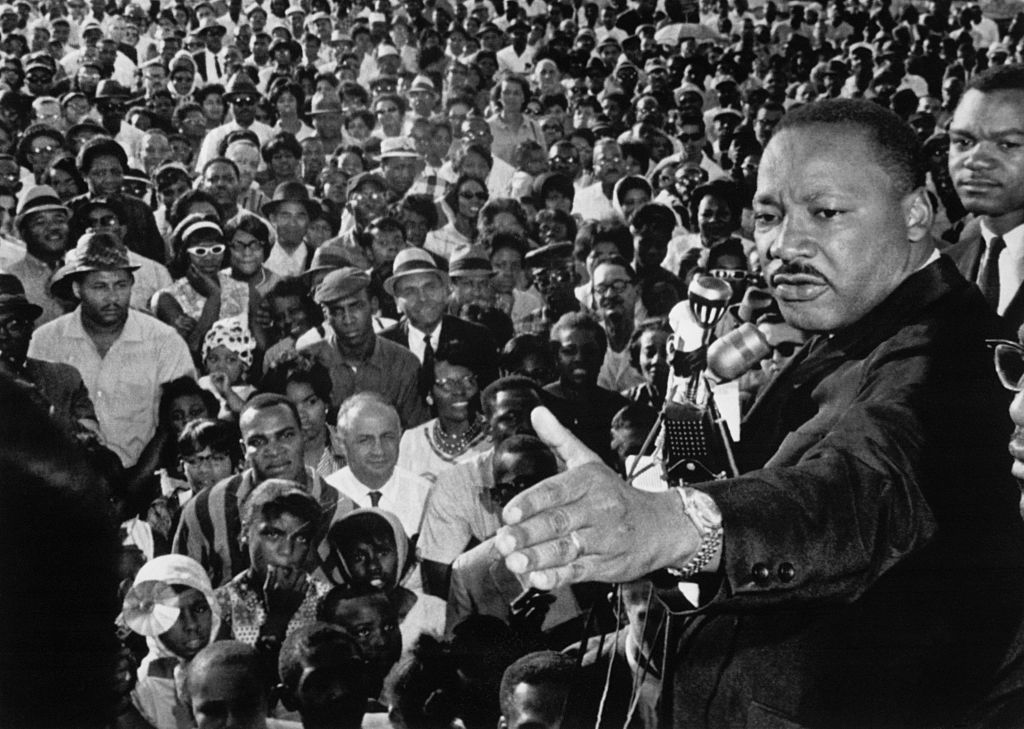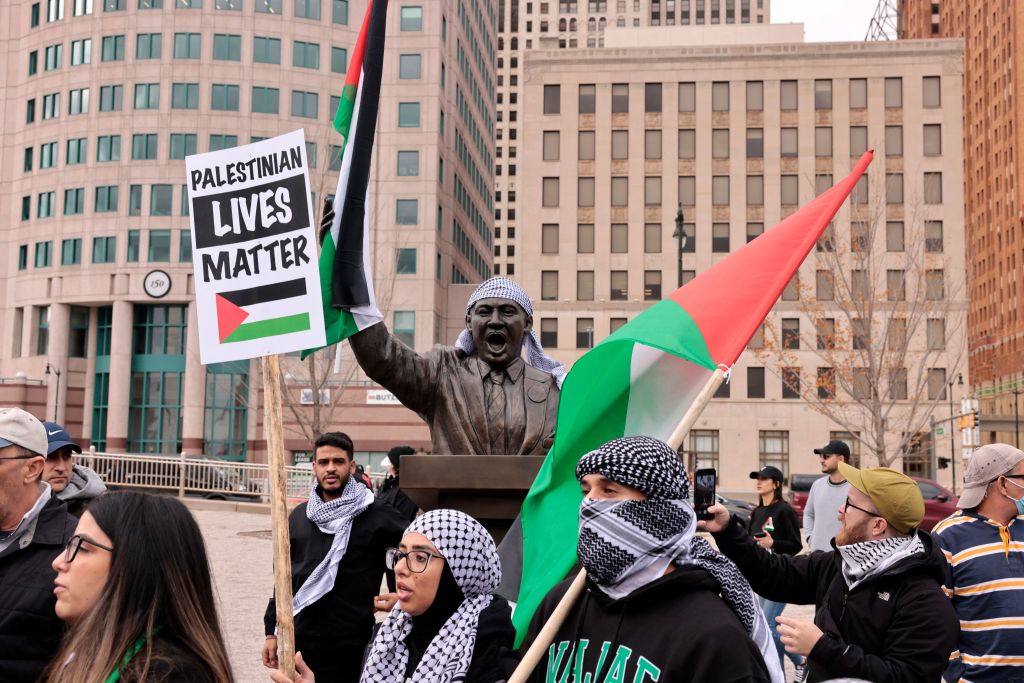MLK Protesting Legacy: Public Inconvenience Was A Hallmark
Op-Ed: How Does One Conveniently Protest A Genocide? Inconvenience Is A Hallmark Of MLK’s Legacy

Source: Bettmann / Getty
How does one conveniently protest genocide?
We sit in the shadow of the annual Martin Luther King, Jr. holiday celebrations. Politicians and preachers—conservative and otherwise—extol the virtues of the United States’ most famous nonviolent prophet. Nonprofits, church groups and ordinary folks have cleaned up public spaces, marched and held conversations on the meaning of nonviolence. Dr. King and his contemporaries are lauded for protesting the “right” way. But history does not bear witness to such an account.
To be sure, in their heyday, Dr. King and the civil rights movement were not popular because of their inconvenient tactics. According to a 1961 Gallup Poll, most Americans weren’t on the movement’s side — a whopping 61% — said they disapproved “of what the ‘Freedom Riders’ were doing.” That same poll illustrated that respondents felt the “Freedom buses,” lunch counter sit-ins and “other demonstrations” would hurt Black folks’ chances of being integrated in the South, with 57% of Americans believing that King and young activists were damaging their cause. The “Letter from a Birmingham Jail” (1963) was written in response to White clergy who believed the civil rights demonstrations were “unwise and untimely.” By August 1966, a mere 12% of all Americans had a highly favorable opinion about Dr. King.
In April 1967, Dr. King’s “A Time to Break the Silence” anti-Vietnam War speech at Riverside Church in New York City was swiftly rebuked. Every major newspaper and civil rights organization—including his own board—condemned him. Some 73% of Americans opposed King’s position and 60% believed he was hurting the civil rights cause. The New York Times described the Riverside sermon as an “error” and all but stated that King should stay in his place. The Seattle Times concurred saying King’s words were a “savage denunciation” bordering on “sedition.”
You see, our popular renditions of Dr. King obscure the reality of his unpopularity. The powerful often want the powerless and their allies to protest in popular (read: mythical) and convenient ways. And now history seems to be repeating itself. Recently— in liberal Seattle and a county named for Dr. King—brave young people placed their bodies on the line by shutting down Highway I-5 to call for a ceasefire in Gaza. Their action which inconvenienced commuters was met with an all too familiar disdain.
The Seattle Times Editorial Board’s op-ed urging leaders “to dissuade dangerous freeway protests” echoes an unforgiving past. Citing the unpopular response to the I-5 action, the editorial board issued a strident warning: “Those seeking to influence national and international politics must not have unfettered ability to inflict pain on local residents.” The Seattle Times argues that the protest should be lawful–not one major protest in the civil rights movement was lawful. Protesting apartheid in South Africa was not lawful. In many states, it is unlawful to boycott the state of Israel. Lawful is often a thinly veiled covering for the immoral.
Militant nonviolence civil disobedience — as King named it in “The Trumpet of Conscience” — executes mass protest and mass disruption to create a moral drama to push the public to pressure politicians to change their course. Sit-ins, marches, road blockages, Freedom Rides, street theater and other direct actions have always been unpopular and unlawful until they are not. Over time courage trumps convenience. In short, inconvenience to the public is a hallmark of Dr. King’s legacy.

Protesters carrying a “Palestinians Lives Matter” sign walk past a statue of Martin Luther King Jr. wearing a keffiyeh and holding a Palestinian flag on Hart Plaza in downtown Detroit, Michigan, during a rally and march calling for a ceasefire on October 28, 2023. | Source: JEFF KOWALSKY / Getty
I traveled to Palestine with Rev. Dr. Vincent Harding, who wrote the first half of Dr. King’s anti-Vietnam War speech. Along with Dr. Clayborne Carson, the world’s leading King scholar, and Dorothy Cotton, who worked closely with Dr. King, we witnessed the illegal and immoral occupation and apartheid in Palestine. These civil rights veterans said without any equivocation that Dr. King would say to end the occupation and would urge protest to that effect. After the Israeli-Arab War (1967), King refused to go to Israel. “I just think that if I go, the Arab world, and of course Africa and Asia for that matter, would interpret this as endorsing everything that Israel has done, and I do have questions of doubt.” To this end, I have no doubt that Dr. King would have been on I-5 calling for a ceasefire.
Moreover, the “pain” (read inconvenience) inflicted upon local residents is a small price to pay to stop the continued slaughter of tens of thousands of children in Palestine. Finally, in earnest, I ask: “How does one conveniently protest a genocide?”
Noted organizer, musician, and theologian, Rev. Osagyefo Sekou is a pastor of Valley and Mountain Fellowship United Methodist Church in Seattle, Washington. Rev. Sekou is a Religious Studies Phd candidate at Goldsmiths, University of London.
SEE ALSO:
















